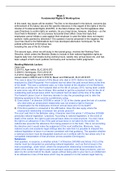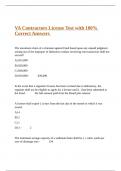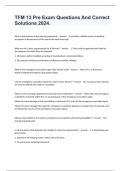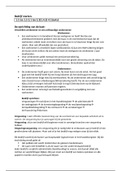Fundamental Rights & Working-time
In this week, two issues will be studied. The first, to be discussed in the lecture, concerns the
enforcement of EU labour law and the specific relevance in this regard of the rights in the EU
Charter of Fundamental Rights (EUCFR). In the field of labour law, the EU legislature often
uses Directives to confer rights on workers. As you (may) know, however, directives – as the
Court held in Marshall - do not produce horizontal direct effect. Does this imply that
employees cannot initiate a case against their employer in case the latter does not respect
workers’ rights granted by directives? The question must be answered in the negative: the
Court has stuck to the Marshallrule but it has developed alternative ‘techniques’ for the
judicial enforcement of EU labour law,
including the use of the EU Charter.
The second topic, which we will study in the tutorial group, involves the Working-Time
Directive, which orders the Member States to include in their national legislation rights as
regards daily rest, rest breaks during working hours, weekly rest, annual leave etc. and has
been subject of both much political controversy and numerous CJEU judgments.
Reading Materials Lecture:
Case Law:
C-201/15, Aget Iraklis, EU:C:2016:972
C-282/10, Dominguez, EU:C:2012:33
C-414/16, Egenberger, EU:C:2018:257
Joined cases C-569/16 and C-570/16, Bauer and Willmeroth, EU:C:2018:871
This case is about the husband of Mrs Bauer who died in 2010. Before his death, he was
employed by Stadt Wuppertal. Her husband had not taken the paid annual leave at the time
of his death. This was a combined case, so it also looked at the situation of mrs Broßbonn,
which was a similar one. Her husband died on the 4th of January 2013, having been unable
to work since July 2012 due to illness. She wanted to get the a payment in lieu for the 32 of
outstanding paid annual leave which her husband had not taken at the time of his death.
The Federal Labour Court in Germany decides to stay the proceedings and to refer the
following questions to the court for a preliminary ruling:
1) Does article 7 of directive 2003/88 or article 31 (2) of the charter grant the heir of a worker
who died while an employment relationship was not ended a right to financial
compensation for the employees minimum annual leave prior to his death?
2) If the first question is answered in the affirmative: Does this also apply where the
employment relationship is between two private persons?
The court said that in the Bollacke ruling, it became clear that article 7 of Directive 2003/88
precludes national legislation / practices. According to national legislation, in the event of
death of the worker, the right to paid annual leave does not exist anymore. You don’t have
the right to an allowance in lieu if the paid annual leave is not taken by the worker. So
national law prevents the allowance from being passed on to the heirs. This is not according
the directive and it would make the judgement of the court ineffective. Moreover, many
national courts and academic legal writings take the view that it is possible to interpret the
national legislation at issue in a manner consistent with that guidance. The question whether
a national provision must be disapplied inasmuch as it conflicts with EU law arises only if no
compatible interpretation of that provision proves possible (Dominguez).
Substance
First question, in essence, is whether article 7 of Directive 2003/88 and Article 31(2) of the
charter must be interpreted as precluding national legislation, such as that at issue in the
main proceedings, under which, where the employment relationship is terminated by the
death of the worker, the right to paid annual leave acquired under those provisions, and not
taken by the worker before his death, lapses without being able to give rise to an entitlement
to an allowance in lieu of that leave which may be passed on to the workers legal heirs by
, inheritance. The court referred to the Bollacke case stating that provision of EU law must be
interpreted as meaning that it precludes national legislation or practices which provide that
the right to paid annual leave lapses without conferring any right to an allowance in lieu of
leave not taken where the employment relationship is terminated by the death of the worker.
Th referring court in this case however, had doubts concerning the interpretation adopted by
the court, on the ground, essentially, that the purpose of the right to paid annual leave, which
is to enable the worker to rest and to enjoy a period of relaxation and leisure, no longer
appears to that court to be capable of being met once the person concerned has died.
While the worker’s death has the inevitable consequence of depriving him of any effective
possibility of enjoying the period of rest and relaxation attaching to the right to paid annual
leave to which he was entitled at the time of his death, it cannot be accepted that his death
retroactively entails the total loss of the right thus acquired which, as recalled in paragraph
39 of the present judgement, includes a second aspect of equal importance, namely the
entitlement to payment. The court also held that article 7 must be interpreted as meaning that
a worker is entitled to an allowance in lieu of paid annual leave not taken due to the fa t that
he has not performed his duties because of illness. Nor is such a worker able to enjoy leave
as a period int need to allow him to rest and relax with a view to the future pursuit of his
occupational activity, since he has entered a period of occupation inactivity and is able to
benefit only from the financial aspect of paid annual leave.
Secondly, the right to paid annual leave is laid down in article 31 (2) of the charter. According
to article 6 (1) the charter has the same legal value as the treaties. Since the national
legislation at issue in the main proceedings is an implementation of directive 2003/88, it
follows that article 31(2) of the charter is intended to apply to the cases in the main
proceedings. From the wording of article 31 (2) of the charter it follows that the provision
enshrines the right of all workers to an annual paid leave. Limitations may be imposed on
that right under the strict conditions laid down in article 51 (1) of the charter and, in particular
of the essential content of that right. Thus, member states may not derogate from the rule
laid down in article 7 of Directive 2003/88, read in the light of article 31 (2) of the charter, that
the right to paid annual leave acquired cannot be lost at the end of the leave year and/or of a
carry over period fixed by national law, when the worker has been unable to take his leave.
Member states are similarly precluded from deciding that termination of the employment
relationship caused by death leads retroactively to the complete loss of the right to paid
annual leave acquired by the worker, since such a right, aside from the right to leave as
such, includes a second aspect of equal importance, namely the entitlement of payment,
justifying the payment to the person concerned or his legal heirs of an allowance in lieu of
annual leave not taken upon termination of the employment relationship.
Therefore, in relation to situations falling within the scope of article 31(2) of the charter, that
provision has the effect that it is not open to member states to adopt legislation pursuant to
which the death of a worker retroactively deprives him of the right to paid annual leave
acquired before his death, and accordingly his legal heirs of the allowance in lieu thereof by
way of the financial settlement of those rights.
To conclude: article 7 of the directive and article 31 (2) of the charter must be interpreted as
precluding national legislation, such as that at issue in the main proceedings, under which,
upon termination of the employment relationship because of the worker’s death, the right to
paid annual leave acquired under those provisions and not taken by the work before his
death lapses without being able to give rise to an allowance in lieu of that leave when
customers is transferable to the employee’s legal heirs by inheritance.
If it comes to the second question, the court has held that provisions of a directive that are
unconditional and sufficiently precise may be relied upon by individuals, in particular against
a member state and all the organs of its administration, including decentralised authorities.
The court has already held that article 7 (1) of Directive 2003/88 satisfies those criteria of
unconditional and sufficient precision. So this article fulfils the conditions required to produce
direct effect. As regards article 7 (2) of that directive, that provision does not lay down any
condition for entitlement to an allowance in lieu other than that relating to the fact that the
employment relationship has ended and secondly, that the worker has not taken all the












